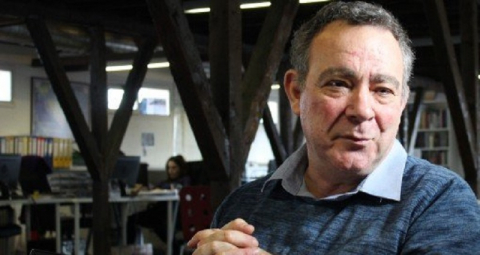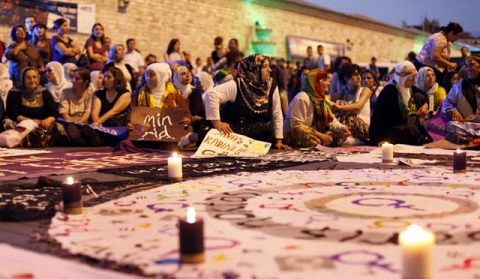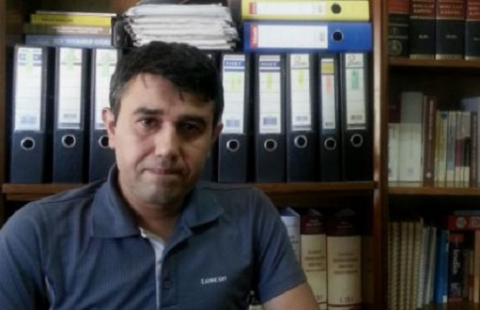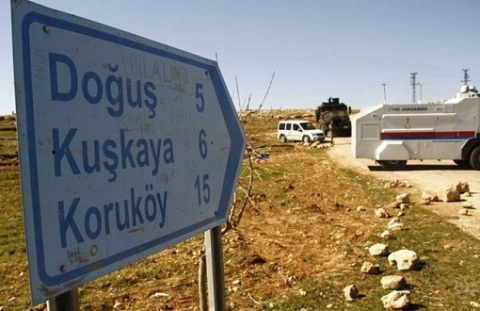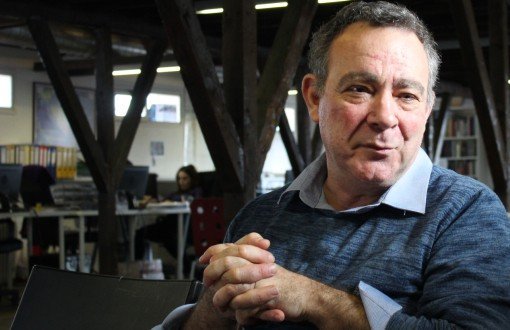
Hafiza Merkezi co-director Murat Celikkan's defence in court: "Propaganda can Only be bad journalism"
In the Prosecution’s Bill of Indictment, I am being charged with “propaganda on behalf of a terrorist organization”, “encouragement to commit a crime ”, “praising a crime or a criminal” and in doing this, “posing a clear and imminent danger to public order” because of three news reports published in the Özgür Gündem Newspaper, for which I served as chief editor for one day. It is clearly not legitimate to hold responsible someone who has served as chief editor for a day, when there are reporters of the newspaper who write the news items, and directors-in-charge who are responsible before the law. Besides, it is impossible to understand the logic of the Prosecutor’s Office in perceiving as an offence the practice of serving as Chief Editor on Watch for a day, which was an action clearly carried out in solidarity for freedom of expression and freedom of the press. Moreover, regarding Article 7 of the Counter-Terrorism Law, which forms the basis of these charges, both the European Court of Human Rights, and international and domestic legal institutions have stated that this article should be rescinded since it is being used “to punish press workers who work for the public good, and have the sole aim of providing the public with accurate news” and since it does not comply with democracy and the freedom of expression. Besides, since this Article punishes those who have not taken part in the commission of offence, it does not comply with the principle of individual criminal responsibility either. As one last general reminder, I would like to state that, according to statistical data published by the ECHR regarding the period from the year 1959 to the year 2015, out of a total of 619 rulings for the violation of Article 10, 258 rulings concerned Turkey. This means that Turkey is by far the leader in terms of violations of this Article among all member states (The number of violations for the member state with the second highest number of violations is 34). The sentence that the prosecutor demands concerns three news reports, titled “Bahar Gülüşlü Cesur Çocuk/Brave Child with the Smile of Spring’’, “Heron Düşürüldü Kobra Darbelendi/Heron Downed, Kobra Hit’’ and “Savaş Uçakları Kenti Vuruyor/War Planes Target City’’, respectively. It is not the job of a chief editor to be aware of every single news item published in the newspaper. But I won’t offload the responsibility. It is clear that all three news report that allegedly constitute “elements of crime” are news, and that the public good has been observed in publishing them. The essence of the matter is whether these reports are true, or not. Even if they were not true, it is not the task of the Prosecutor’s Office to pass sentence on them. And besides, to express truths, and to seek truths, to inform the public, and to try to present different aspects of the truth does not constitute propaganda. Moreover, propaganda is merely bad journalism. The article titled “Bahar Gülüşlü Cesur Çocuk/Brave Child with the Smile of Spring’’ tells the story of a young man, who was reported missing by his family, who had deserted the army because his commanders did not prevent the pressure and attacks he faced because he was Kurdish, and who later died whilst fighting for the PKK – it is both clearly a news report, and its publication also falls within the scope of the right to bury and mourn the deceased, whoever they may be, a practice that has been an irrevocable tradition since the time of Sophocles. As for the news report titled “Savaş Uçakları Kenti Vuruyor/War Planes Target City”, the city mentioned here is Mardin, and the place is the district of Nusaybin. In the district of Nusaybin of Mardin province, the population is 113 thousand 594 (87 thousand in the town centre, and 25 thousand 646 in rural areas). In Nusaybin, from October 2015 to March 2016 curfews were declared 7 times, and on 14 March 2016, the 8th curfew was declared. This ban, declared on 14 March, was partially lifted for the hours 5 am-11 pm in 9 neighbourhoods (Gırnavas, İpekyolu, Barış, Devrim, 8 Mart, Selahattin Eyyubi, Yeni Turan, Yeşilkent and Mor Yakup) on 26 July 2016, while the curfew continued full-time in the remaining 6 neighbourhoods (Fırat, Dicle, Yenişehir, Zeynel Abidin, Abdulkadir Paşa and Kışla). Nusaybin had a population of 113 thousand before the implementation of the ban, however, according to the reports of domestic and international human rights organizations, since the beginning of the blockade, the entire population of 42 thousand citizens living in the 6 neighbourhoods surrounded by barbed wire have been forced to migrate, while out of the 46 thousand and 21 people living in the remaining 9 neighbourhoods in the centre 25 thousand people were forced to migrate. The remaining population has continued to live under blockade in the 9 neighbourhoods where the intensity of clashes is lower. During curfews that were first implemented on 1 October 2015 in the district of Nusaybin, 25 civilians have lost their lives, including 2 children and 7 women. (Southeastern Anatolian Region Union of Municipalities Nusaybin Municipality; Association for Social Solidarity with Immigrants, Human Rights Foundation of Turkey, Human Rights Association) Below you will find photographs of Nusaybin, taken during the blockade process and after, and specifically around the time when the abovementioned news items were published. Whatever its grounds, in a State operation that has caused such a huge scale of human and material destruction, it is clear that there has been a disproportional and excessive use of force. The Council of Europe’s Commissioner for Human Rights, in the memorandum he published on the curfews, states that “open-ended and round-the-clock curfews have directly caused a number of human rights violations in their own right (2.1), as opposed to specific human rights violations caused by the implementation of the operations or the conduct of security forces concerning which the Commissioner received numerous, credible and consistent allegations (2.2).” The memorandum goes on to add that, “Regarding this latter category, the failure to carry out effective investigations would lead to further human rights violations (3).” [Strasbourg, 2 December 2016, 44] The Commissioner also “recalls the established case-law of the ECtHR according to which the failure of a state to conduct an effective official investigation where “an individual raises an arguable claim that he has been seriously ill-treated by the police or other such agents” constitutes a violation of the ECHR”. [Strasbourg, 2 December 2016, 81] By issuing this reminder, the Commissioner draws attention to how prosecutors in Turkey remain unwilling to carry out investigations and prosecutions against state officials regarding crimes in categories such as the violation of the right to life, and crimes against humanity, despite the fact that case after case is brought against journalists, writers and academics defending peace, human rights and the freedom of expression and the press. The reasoning outlined above is also valid for the third news report referred to in the bill of indictment, “Savaş Uçakları Kenti Vuruyor/War Planes Target City”. If the claim in the news item, and the image shared is accurate, then there is a violation of international agreements Turkey has signed. If the news report is not accurate, mechanisms of retraction are clearly outlined in relevant laws. No retraction was demanded for this news report. We know from examples both from across the world, and from our country that wars are carried out, in essence, not only with weapons, but first and foremost in the world of information and thought, and especially via the media, and the first victim of war and conflict conditions is the truth. The importance in terms of the public’s right to know the truth of producing news from different sources and various perspectives is clear. The Council of Europe’s Commissioner for Human Rights, in his Memorandum dated 15 February 2017 on freedom of expression and media freedom in Turkey, draws attention to this issue in the following manner: “The Commissioner recalls that media pluralism and diversity of media content are essential for the functioning of a democratic society and are the corollaries of the fundamental right to freedom of expression and information as guaranteed by Article 10 of the ECHR. States have a positive obligation to guarantee pluralism in the media sector, which entails ensuring that a diversity of voices, including critical ones, can be heard.” Özgür Gündem newspaper, with the reporting it carried out in the 90s, during the clashes that cost the lives of tens of thousands of people, proved its importance in terms of the public’s right to receive information and know the truth. To present a few examples: 1. The Batman Bombing In May 1993, as a result of the explosion of a bomb placed at a minibus stop opposite Hürriyet Primary School, 8 people died. The Governorate of the State of Emergency Region, and the serving Batman Governor announced that the bomb had been planted by the PKK. Both governorates said in statements that the minibus stop where the attack was carried out was used to travel to the villages of village guards, and that it had become a PKK target because of this. During that period, the PKK had not claimed responsibility for the bombing, and had claimed that it had been planned by the State. Özgür Gündem Newspaper published these claims. About 20 years after this incident, Salih Şarman, the Batman Governor of the period, stated that the bombing had been carried out by members of MİT [National Intelligence Organization] and that he had only found out about this later, and could not intervene. 2. The Çalpınar Massacre On 20 April 1992, a massacre took place in the Çalpınar village of Midyat district of Mardin province, 8 people were killed and 9 people were wounded. The massacre took place when a minibus travelling from the village to Nusaybin was stopped by unidentified individuals, the passengers were ordered to disembark from the minibus, and were summarily executed. However, the statement of the wounded and other eye-witnesses indicated that village guards had carried out this massacre. Gündem Newspaper published these claims. As a result of an investigation opened by the Midyat Prosecutor’s Office, the Çalpınar Massacre was investigated in a court case, and finally, in the year 2008, the village guards who were suspects of the massacre were given heavy sentences. 3. The Güçlükonak Massacre The Güçlükonak Massacre took place on 15 January 1996 when, in the Güçlükonak district of Şırnak province, 11 villagers in a minibus were first shot at and then burned. The Presidency of General Staff declared that the massacre had been carried out by the PKK, however, some civilian society organization officials, intellectuals and artists, following observations they carried out in the area, claimed that the incident had been carried out by State forces. Relatives of the victims of the massacre filed court cases. However, no result was obtained from any of the court cases. Gündem Newspaper published these claims. In 2010, ex-Gendarmerie Lieutenant Commander Özcan Tozlu stated that the 11 villagers were massacred by the order of Lieutenant General Selahattin Uğurlu, who is also held responsible of the Şemdinli incident, and that the massacre had been carried out under the observation of Combat Search and Rescue Teams (MAK), only to be later blamed on the PKK. A similar statement was made by State Minister Adnan Ekmen. Ekmen declared that the incident had been carried out not by the PKK, but by JİTEM (Gendarmerie Intelligence and Counter-Terrorism Organization). It is possible to present more such cases. In all of these cases, while other newspapers followed the official line of events, Gündem newspaper published different claims, and Gündem’s claims have today been proven to be accurate and truthful. Freedom of expression is an indispensable building block of a democratic society. According to the European Convention of Human Rights, to which Turkey also is party, freedom of expression includes offensive, shocking or disturbing news and comments, too. A society with a single voice is not a democratic society. Societies where an official truth is imposed, in a hegemonic manner, by different versions and components of the ruling power, are not democratic societies. History is full of examples of how social engineering projects aiming for a single dimension, single voice and single focus imposed by the powers that be have led to devastating destruction for humanity. The struggle carried out in our age to reveal the truth, supports the efforts of societies to solve their clashes through democratic means. This, in turn, helps to consolidate the desires of societies that want to live together not in war, but in peace. To punish and sentence people who report the news, who work as journalists and defend freedom of expression, wounds not only those people, but the democratic system as a whole. The decision of your court will acquit, or punish, not only me, but peace, democracy and press freedom in Turkey as well, or in other words, the idea of Turkey as a democratic, pluralist society. Therefore, although I actually think that this case should not have been filed in the first place, I demand my acquittal.
